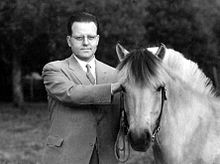
Llewelyn Sherman Adams was an American businessman and politician, best known as White House Chief of Staff for President Dwight D. Eisenhower, the culmination of an 18-year political career that also included a stint as the 67th governor of New Hampshire. He lost his White House position in a scandal when he accepted an expensive vicuña coat.

Gordon Gray was an American attorney and government official during the administrations of Harry Truman (1945–53) and Dwight Eisenhower (1953–61) associated with defense and national security.
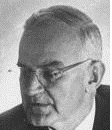
Robert Cutler was an American government official who was the first person appointed as the president's National Security Advisor. He served US President Dwight Eisenhower in that role between 1953 and 1955 and from 1957 to 1958.
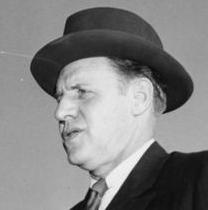
Robert Daniel Murphy was an American diplomat. He served as the first United States Under Secretary of State for Political Affairs when the position was established during the Eisenhower administration.
Robert Henry Winborne Welch Jr. was an American businessman, political organizer, and conspiracy theorist. He was wealthy following his retirement from the candy business and used it to sponsor anti-communist causes. He co-founded the far right group the John Birch Society (JBS) in 1958 and tightly controlled it until his death. He was highly controversial and criticized by liberals, as well as some mainstream conservatives, including William F. Buckley Jr.

The Dwight D. Eisenhower Presidential Library, Museum and Boyhood Home is the presidential library and museum of Dwight David Eisenhower, the 34th president of the United States (1953–1961), located in his hometown of Abilene, Kansas. The museum includes Eisenhower's boyhood home, where he lived from 1898 until being appointed to West Point in 1911, and is also the president's final resting place. It is one of the thirteen presidential libraries under the auspices of the National Archives and Records Administration (NARA)
General Charles Douglas Jackson was a United States government propagandist and senior executive of Time Inc. As an expert on psychological warfare he served in the Office of Strategic Services in World War II and later as Special Assistant to the President in the Eisenhower administration.
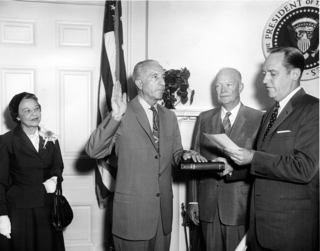
Wilton Burton "Jerry" Persons was an American military officer who served as the White House Chief of Staff to President Dwight D. Eisenhower from October 7, 1958 until January 20, 1961.

Allan B. Hubbard finished his term as the Assistant to President George W. Bush for Economic Policy and Director of the National Economic Council at the end of 2007.

Dwight D. Eisenhower's tenure as the 34th president of the United States began with his first inauguration on January 20, 1953, and ended on January 20, 1961. Eisenhower, a Republican from Kansas, took office following a landslide victory over Democrat Adlai Stevenson in the 1952 presidential election. John F. Kennedy succeeded him after winning the 1960 presidential election.

Joseph Morrell Dodge was a chairman of the Detroit Bank, now Comerica. He later served as an economic adviser for postwar economic stabilization programs in Germany and Japan, headed the American delegation to the Austrian Advisory commission, and worked as President Dwight D. Eisenhower's director of the Bureau of the Budget.

Charles C. Finucane was an American government official, and banking and investments executive.
Tom B. Coughran was an American banker, soldier and public servant. He graduated from Visalia High School in 1923 and received a degree in economics from Stanford University in 1927. Following graduation he joined the First National Bank of Exeter, California. When that bank was bought by Bank of America, Coughran advanced quickly. He was named manager of the Exeter branch in 1932 and promoted to head of the Monterey branch in 1941.
Clarence Francis was a business executive and internationally recognized expert on food.
Katherine Graham Howard was a graduate of Smith College with a bachelor's degree in politics and government. During the Eisenhower administration she served in the Federal Civil Defense Administration, U.S. delegate to NATO committee on civil defense, and Deputy U.S. Commissioner General to the Brussels World Fair. She was the daughter of artist Margaret Nowell Graham and Joseph L. Graham, a director at R.J. Reynolds. Her brothers were John Stephens Graham and Gregory Graham.
Donald Paarlberg was a farmer, author, professor of agricultural economics, and a coordinator of the Food for Peace program.
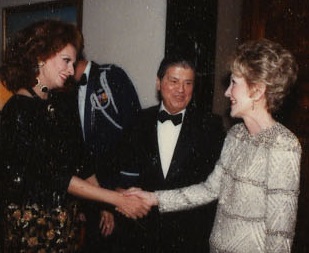
Maxwell Milton Rabb was a lawyer who served in various positions as an advisor to U.S. President Dwight D. Eisenhower, and later as Ambassador to Italy under President Ronald Reagan.
The U.S. Council on Foreign Economic Policy (CFEP) was a high-level organization created by President Dwight D. Eisenhower in December 1954 to coordinate the development of the foreign economic policy of the United States.
Samuel Clark Waugh was an American official with the U.S. Department of State. Waugh was born in Plattsmouth, Nebraska and from 1911 to 1912 was a student at the University of Nebraska.
Edward A. Bacon (1897–1968) was born in Milwaukee, Wisconsin and attended the Milton Academy from 1912 to 1916. In 1918, Bacon served in United States Marine Corps and earned an A.B. from Harvard University by 1920.
